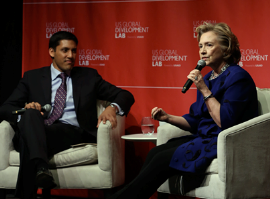
For Immediate Release
WASHINGTON, D.C. - The U.S. Agency for International Development (USAID) Administrator Rajiv Shah announced on April 3 the establishment of the U.S. Global Development Lab at an event in New York City. The launch event featured a keynote address by former U.S. Secretary of State Hillary Rodham Clinton, who has been a strong supporter of the use of science, innovation, and partnerships to further U.S development goals. The Lab and its 32 inaugural Cornerstone Partners will advance a science-and technology-based approach to development, creating a new global marketplace of innovations and taking them to scale to help end extreme poverty by 2030.
The U.S. Global Development Lab will support breakthrough solutions in water, health, food security and nutrition, energy, education, and climate change, reaching 200 million people in the next five years. Reflecting the proven impact of science and innovation, USAID has increased its investments. In 2008, USAID spent roughly $127 million to support research and development. Today, the Agency spends $611 million—not only on research, but innovation and applied solutions in science and technology.
“The Lab will engage a global community of inventors, academics, researchers, entrepreneurs, investors, and corporate leaders in science and technology to invent, test, and scale the most promising and cost effective solutions to end extreme poverty,” said Shah.
The Lab’s Cornerstone Partners include a large cross-section of corporations: Cargill, Cisco, Citi, Coca-Cola, DuPont, GlaxoSmithKline, Intel, Johnson & Johnson, Microsoft, Nike, Syngenta, Unilever, and Walmart; civil society organizations and foundations: Care, the Bill & Melinda Gates, Catholic Relief Services, Global Impact Investing Network, Plan, Save the Children, the Skoll Foundation, World Vision, the National Academy of Sciences, and the Smithsonian Institution; universities: The University of California at Berkeley, Duke University, Johns Hopkins University, Massachusetts Institute of Technology, Michigan State University, Stanford University’s Freeman Spogli Institute, Texas A&M University, and the College of William and Mary; and a bilateral donor: Sweden.
Armenia is selected as one of USAID’s twenty lead missions worldwide that will champion science, technology, innovation and partnership (STIP) initiatives. Administrator Shah’s efforts to highlight the role of science and technology in development have an appropriate home in Armenia – once Soviet Union’s main hub for software development, industrial computing, electronics, and production of semiconductors. In recent years, USAID has invested nearly $45 million in STIP-related projects in Armenia, particularly in the sectors of high technologies, energy and water, governance, and health care.
The Head of USAID/Armenia, Karen Hilliard, says: “STIP is an integral part of our development approach here in Armenia. Building on the country's comparative advantage and the strong aptitude of its workforce in mathematics and science, USAID will continue to seek opportunities to apply new technologies to Armenia's development challenges and help Armenia transition to a competitive, knowledge-based economy. Going forward, we intend to emphasize projects in water resource management and clean energy.”
USAID is also furthering technical excellence in Armenia by creating partnerships with US firms to strengthen scientific and engineering programs. In partnership with the State Engineering University of Armenia, the National Instruments, and the Enterprise Incubator Foundation, USAID/Armenia established an Armenian National Engineering Lab (ANEL) to offer engineering certification courses, upgrade scientific research and deliver customized engineering solutions to the industry. Another important partnership for innovation is the Microsoft Innovation Center, which provides certification courses and promotes unique software solutions to key challenges in the economy.







Comment
Make a general inquiry or suggest an improvement.